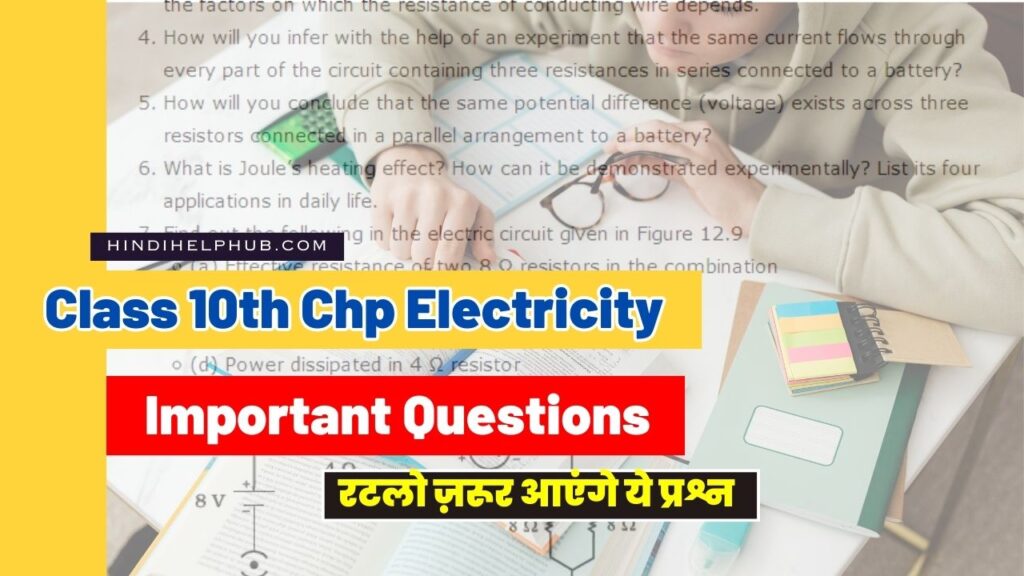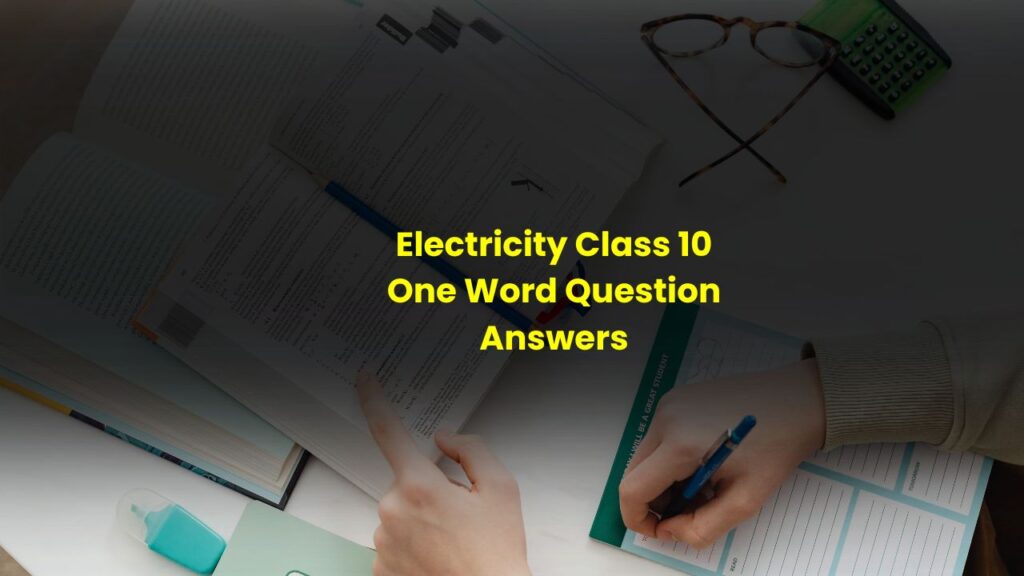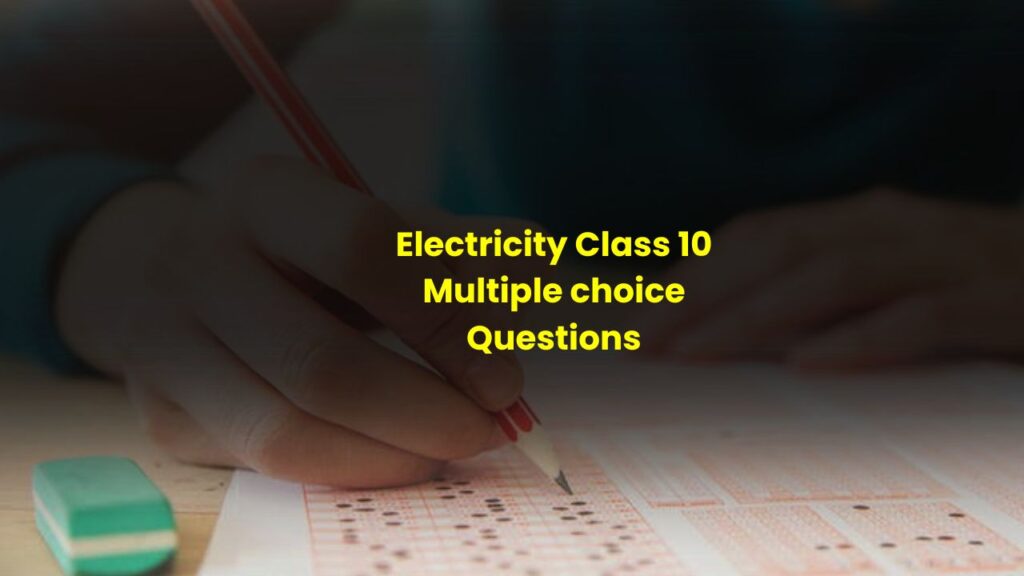नमस्कार साथियों क्या आप जानना चाहते है Electricity Class 10 Important Questions के बारे में? दोस्तों आपका स्वागत है इस लेख में, हम आपको Science Subject के सभी Important Questions 2024 के बारे में सब बताएंगे।

दोस्तों इस लेख में बताये गए सभी जरुरी प्रश्न हमने 2021, 2022 और 2023 के Electricity Class 10 Important Questions से इकठे किए है। दोस्तों ये सभी प्रश् बोहोत महत्वपूर्ण है।
जैसा कि आप जानते हैं Science एक बहुत ही दिमाग लगाने वाला subject है, तो इस लेख में हमने Electricity Class 10 Important Questions साझा किये है।
जो कि आपको पढ़ने में मदत करेंगे अगर आप इस लेख में बताए हुए इन Important Questions को एक बार रट लेंगे तो आप समझ लो आप का 60% syllabus cover हो गया, तो दोस्तों Electricity Class 10 Important Questions की पूरी सूची पढ़ने के लिए इस लेख को अंत तक जरूर पढ़ें ।
Contents
Electricity Class 10 Important Questions
| Board | CBSE Board, UP Board, JAC Board, Bihar Board, HBSE Board, UBSE Board, PSEB Board, RBSE Board, JK Board |
| Textbook | NCERT |
| Class | Class 10 |
| Subject | Science |
| Post Type | Important Question in Hindi |
| Category | Electricity Class 10 Important Questions |
| Medium | Hindi |
Electricity Class 10 NCERT Important Questions
Define electric current.
State Ohm’s law.
What is the difference between a conductor and an insulator?
Explain the concept of electrical resistance.
What is the relationship between resistance and length of a conductor?
How does temperature affect the resistance of a conductor?
What is the purpose of an electric fuse?
Explain the principle of electric heating.
What is the difference between series and parallel circuits?
How does the total resistance change in a series circuit?
Calculate the current flowing through a 10 ohm resistor when a potential difference of 20 volts is applied across it.
Find the total resistance of a circuit with two resistors, 5 ohms and 10 ohms, connected in series.
Determine the total current in a parallel circuit with two resistors, 2 ohms and 4 ohms, connected to a 12-volt battery.
Calculate the power consumed by a 100-watt bulb when connected to a 220-volt supply.
A heater coil of resistance 100 ohms is connected to a 220-volt supply. Find the heat generated in the coil in 1 minute.
A 100-watt bulb is connected to a 220-volt supply for 5 hours. Calculate the energy consumed.
A 100-watt bulb and a 60-watt bulb are connected in series to a 220-volt supply. Which bulb will glow brighter?
A 100-watt bulb and a 60-watt bulb are connected in parallel to a 220-volt supply. Which bulb will glow brighter?
A 100-watt bulb and a 60-watt bulb are connected in series to a 220-volt supply. Which bulb will consume more power?
A 100-watt bulb and a 60-watt bulb are connected in parallel to a 220-volt supply. Which bulb will consume more power?
Electricity Class 10 One Word Question Answers

- The unit of electric current is _____.
- The flow of electric charge is called _____.
- The opposition to the flow of electric current is called _____.
- The device used to measure electric current is _____.
- The unit of electric potential difference is _____.
- The device used to measure electric potential difference is _____.
- The relationship between electric current, potential difference, and resistance is expressed by _____.
- The unit of electrical resistance is _____.
- A device used to protect electrical circuits from excessive current is _____.
- The rate at which electrical energy is converted into other forms of energy is called _____.
- The unit of electric power is _____.
- A device used to convert electrical energy into heat energy is _____.
- The device used to convert electrical energy into light energy is _____.
- A circuit in which the components are connected end-to-end is called a _____.
- A circuit in which the components are connected between two common points is called a _____.
Answers
- Ampere
- Electric current
- Resistance
- Ammeter
- Volt
- Voltmeter
- Ohm’s law
- Ohm
- Fuse
- Electric power
- Watt
- Heater
- Bulb
- Series circuit
- Parallel circuit
Electricity Class 10 Multiple choice Questions

The unit of electric current is:
(a) Volt
(b) Ampere
(c) Ohm
(d) Watt
Ohm’s law states the relationship between:
(a) Electric current and resistance
(b) Electric current and potential difference
(c) Potential difference and resistance
(d) All of the above
A device used to measure electric current is:
(a) Voltmeter
(b) Ammeter
(c) Ohmmeter
(d) Wattmeter
The unit of electrical resistance is:
(a) Volt
(b) Ampere
(c) Ohm
(d) Watt
A fuse is used to:
(a) Measure electric current
(b) Protect electrical circuits from excessive current
(c) Increase the resistance of a circuit
(d) Decrease the resistance of a circuit
The unit of electric power is:
(a) Volt
(b) Ampere
(c) Ohm
(d) Watt
A device used to convert electrical energy into heat energy is:
(a) Motor
(b) Heater
(c) Generator
(d) Transformer
A series circuit is one in which:
(a) Components are connected end-to-end
(b) Components are connected between two common points
(c) The total resistance is less than the individual resistances
(d) The total current is less than the individual currents
A parallel circuit is one in which:
(a) Components are connected end-to-end
(b) Components are connected between two common points
(c) The total resistance is less than the individual resistances
(d) The total current is less than the individual currents
The formula for calculating electric power is:
(a) P = V/I
(b) P = VI
(c) P = I^2R
(d) All of the above
A device used to convert electrical energy into light energy is:
(a) Motor
(b) Heater
(c) Generator
(d) Bulb
The formula for calculating the total resistance in a series circuit is:
(a) R_total = R1 + R2 + …
(b) 1/R_total = 1/R1 + 1/R2 + …
(c) R_total = R1 * R2 * …
(d) R_total = 1/(R1 + R2 + …)
The formula for calculating the total resistance in a parallel circuit is:
(a) R_total = R1 + R2 + …
(b) 1/R_total = 1/R1 + 1/R2 + …
(c) R_total = R1 * R2 * …
(d) R_total = 1/(R1 + R2 + …)
The relationship between electric current, potential difference, and resistance is expressed by:
(a) Ohm’s law
(b) Kirchhoff’s law
(c) Joule’s law
(d) Faraday’s law
A device used to measure electric potential difference is:
(a) Ammeter
(b) Voltmeter
(c) Ohmmeter
(d) Wattmeter
दोस्तों, आपको यह Electricity Class 10 Important Questions पोस्ट कैसी लगी, कृपया हमें कमेंट सेक्शन में बताएं और अगर आपके कोई सवाल हैं, तो बेझिझक हमसे कमेंट बॉक्स में पूछें। अगर आपको यह पोस्ट उपयोगी लगी हो तो कृपया इसे दूसरों के साथ शेयर करें और hindihelphub बुकमार्क करे।